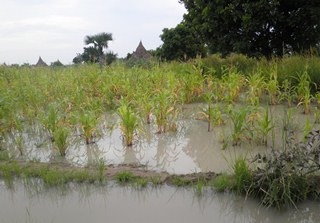Unity state: Hunger on rise as seed shortages hit Payinjiar
By Bonifacio Taban Kuich
May 5, 2013 (BENTIU) – Residents in Unity state’s Payinjiar county are facing severe seedling shortages, urging both the government and international NGO’s to help provide seeds before the start of the rainy season.

Some 40,000 people were displaced in the areas of Nyal, Gakal, Pathiel, Duong, Ganyliel and Tayar as a result of the flooding.
Those who have fled the region and are taking refuge in Bentiu town ahead of the rainy season told Sudan Tribune the lack of seeds would prevent farmers cultivating crops.
Michael Banak Dahnier, who is from Nyal payam [district] in Payinjiar county, says 16 people have starved to death as a result of the poor harvest following the 2012 flooding.
Dahnier added that the situation was likely to worsen, with the lack of seeds set to discourage agricultural activities.
“I’m appealing to international organisations to intervene to provide us seeds; this would help us to improve the current starvation in the county”, said Dahnier.
“If we are not provided with seeds the suffer[ing] will continue, but the only thing to stop what [is] happening is only if the government and NGOs provide us with seeds in order to focus on agriculture in order to produce food for ourselves”, he added.
He has urged the government to do what it can in order to avoid flooding reoccurring, which has made many citizens vulnerable in the state.
Payinjiar commissioner Simon Chuol Biel says the lack of seeds will significantly hamper farmers’ ability to cultivate their crops.
“Our concern [is to] request to both government and NGOs to provide seeds to the county only for this year. But I hope [in the] coming year the county will be able to supply themselves with seeds because they are going to cultivate this year and hopefully if the rain will continue they will have good production for coming year, whereby they will not ask any seeds from NGOs”, said Biel.
Farmers in the low lying, flood-prone area are particularly vulnerable at the beginning of the rainy season.
NGO Norwegian People Aids have already stepped in by funding the construction of dyes in flat low-lying areas along the river.
County officials told Sudan Tribune that the organisation has released the first installation of 40,000 South Sudanese Pounds for the project.
However, the commissioner said the funding is not enough and is urging NGOs to provide greater assistance to the more than 60,000 flood-affected people in the area.
He says the South Sudanese government has come under criticism from residents in the area, who say it has failed to adequately respond to the food security crisis.
More than a thousand Payinjiar residents at risk of starvation are currently in Bentiu.
In a series of interviews with Sudan Tribune on the ground, county officials said the deteriorating conditions last month were to blame for the deaths of the 16 people.
A join assessment team from UN agencies, led by the Office for the Coordination of Humanitarian Affairs (OCHA), recently visited the area, but have yet to respond to the crisis.
(ST)
